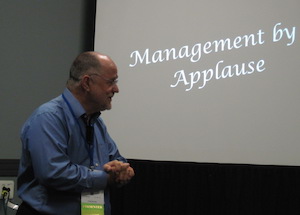Dale: Smart Phones Belong in Schools
- By Patrick Peterson
- 01/23/15

Warren Dale presented "Hey Administrators, There's an App for That" Thursday at the FETC 2015 conference Thursday in Orlando.
Educators can increase their power by maximizing the use of the apps available on their smart phones, according to Warren Dale, technology facilitator for the Los Angeles Unified School District.
"The personal power you can gain by using one of these is learning at the highest level," Dale said, holding up his phone during a brief session of FETC 2015 in Orlando, FL. "This is where our schools are. This is where our world is going."
Dale said the smart phone is a crucial tool to supervise teachers in a school, and he uses it avoid conflicts and to create a schedule that his co-workers and family can access. When a teacher calls about a maintenance problem, he immediately brings the maintenance department into the conversation with a three-way call.
When he meets with a teacher who has a complaint, he sets a timer so the meeting has a definite end time.
"Any problem will expand to fill the time you give it," said the former math and technology teacher.
Schools are slow to adopt new technologies, and the use of smart phone apps is far behind where it should be, Dale said.
"Why does it take so long to get this cool stuff into the classroom?" he said. "It only took 40 years to get the overhead projector out of the bowling alley and into the classroom."
He uses the Siri voice-to-text feature to send messages quickly and said he finds it is important to show students that they can use that function too.
"When the kids see teachers using apps, it shows kids it's good, and they will try it," Dale said.
Dale also uses his phone's camera liberally.
"If you walk into a classroom and you see something cool going on, take a picture of it. Then message the teacher with a note and the picture," Dale said. Teachers usually love getting the photo.
He also sends photos to parents, but he only photographs kids who have signed releases allowing them to be photographed.
Communication is infectious.
"When teachers start getting these things, others are going to want more," he said.
And the good will created by this habit has paid off when a contentious issue has arisen.
"Stuff that might be a problem later doesn't fester as much," Dale said.
He added that school Web sites and Facebook pages are helping administrators communicate with teachers and parents.
"I'm seeing superintendents in California who post to their Facebook from classrooms," he said. "In the last year the use of technology is exploding."
And students are using smart phone technology to complete history projects, maps and movies. Some students are even linking their school projects to QR codes, which allow them to be accessed with a smart phone.
Dale always encourages such innovations.
"We're changing what it means to be a teacher," he said. "Your school will transform when you start managing by applause."
About the Author
Patrick Peterson worked for Florida Today, a Gannett daily newspaper in Brevard County, Fla., from 2005 through 2013, and earlier was embedded with U.S. Marines as a reporter during the 2003 invasion of Iraq. In Biloxi, Miss., he was a reporter for The Sun Herald newspaper and also founded and ran a charter boat company. He is a journalism graduate of Louisiana State University.